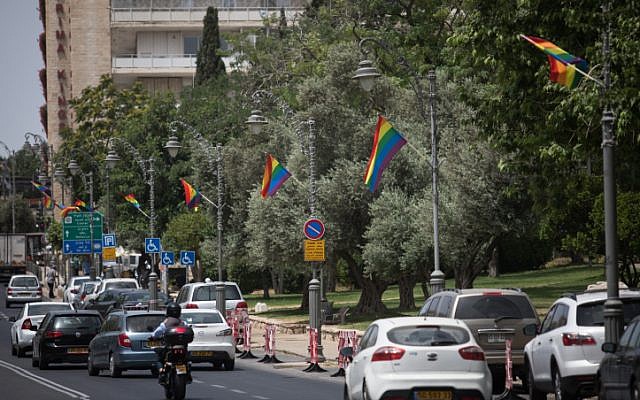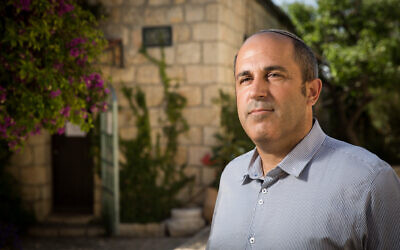Far-right deputy mayor hails prevention of attempt to ‘defile Jerusalem’s sanctity,’ but city hall and embassy say banner will be put up without delay when permission given

The Jerusalem Municipality on Tuesday removed an LGBT pride banner from an external wall of a US Embassy facility in the capital, after a far-right deputy mayor alerted authorities to the fact that the embassy had failed to request permission to hang the sign.
Hebrew-language media reports said Deputy Mayor Arieh King had sent inspectors to cover up the sign at the embassy’s Palestinian Affairs Unit on Agron Street in central Jerusalem. The sign had expressed support for “tolerance and diversity.”
“The PRIDE sign at the US Embassy Jerusalem was temporarily taken down today [Tuesday, June 23, 2020] pending a discussion with the City of Jerusalem municipal government. The PRIDE sign will be rehung as soon as possible on the Embassy property,” the US Embassy said in a statement.
The reports quoted a municipality statement as saying that putting up the banner required approval, and “unfortunately we cannot deviate from the rules with anyone seeking to put up a sign.”
#Exclusive: Israel police ordered United States Embassy to cover #Pride flag displayed every June, according to knowledgable source who said about 20 motorcycle cops drove up & demanded banner be removed. Have requested explanation from @israelpolice & @usembassyjlm 🏳️🌈 pic.twitter.com/0DlV8BWqvq
— Noga Tarnopolsky (@NTarnopolsky) June 23, 2020
“If approval is requested, and the sign adheres to the rules, it will be given without any delay,” the statement said.
But another deputy mayor, Fleur Hassan Nahoum, asserted on Twitter that no such approval was required.
The sign was reportedly rehung late Tuesday night.
No he can’t, they didn’t need permission according to the law.. I am rectifying the situation
— פלר חסן נחום Fleur Hassan-Nahoum (@FleurHassanN) June 23, 2020
King earlier told the right-wing Arutz Sheva website that “nobody is allowed to break the law, whether you are an anonymous private person or a senior official.
“Any body that tries to defile Jerusalem’s sanctity should be opposed,” he said. “That’s true in the case of an Israeli body, and definitely if it is a guest coming to the city.”
Open House Jerusalem, a LGBT rights group, said the sign was put up at the same spot every June to mark Pride Month, when pride marches and other pro-LGBT events are held throughout the country.
The compound on Agron Street is a separate complex from the main embassy building. It resides in a heavily-trafficked area of downtown Jerusalem, next to the route of the capital’s annual Pride Parade. The parade was canceled this year due to the coronavirus pandemic.
In a statement, the Open House attacked King for “trying again to marginalize the LGBT community instead of working for the benefit of all Jerusalemites. This attempt is doomed to fail.”

Another LGBT rights group, Aguda, attacked city hall.
“Shame on the Jerusalem Municipality for continuing to ignore a whole community and validating Deputy Mayor Aryeh King’s violent hatred,” it said. “No covered sign will make us disappear from the public sphere and won’t silence our fundamental demand for equality — not in Jerusalem and not anywhere else in the country.”
In 2019, the US State Department refused permission to the US Embassy in Israel and three other places to fly a Pride flag on a flagpole.
US Vice President Mike Pence defended the decision, saying that only the American flag could be hoisted on the flagpole. He said that that there was no ban on the pride flag, or other flags, flying elsewhere at US embassies.
Days later, the embassy branch office in Tel Aviv decked out its facade with rainbow flags which did not appear to run afoul of the ban.
The U.S. Embassy Branch Office in Tel Aviv is ready for the PRIDE parade tomorrow! pic.twitter.com/pmc50wBli8
— USEmbassyJerusalem (@usembassyjlm) June 13, 2019
As reported by The Times of Israel
